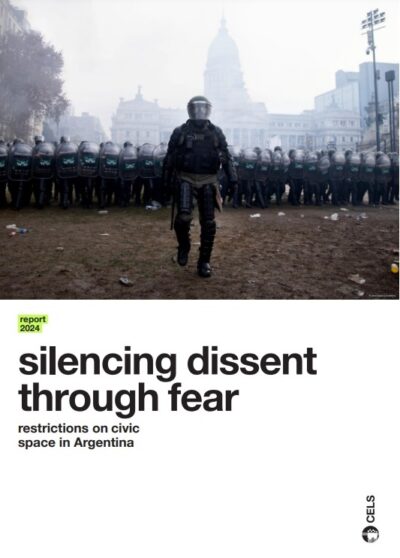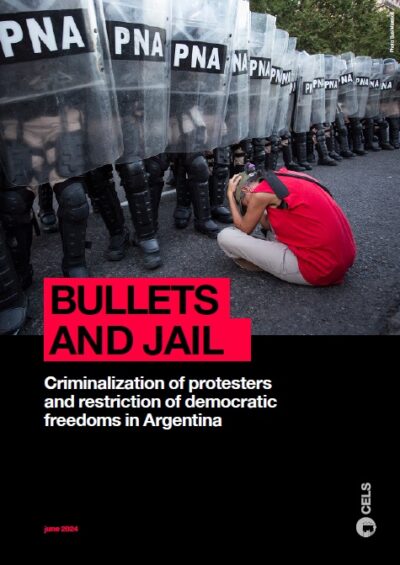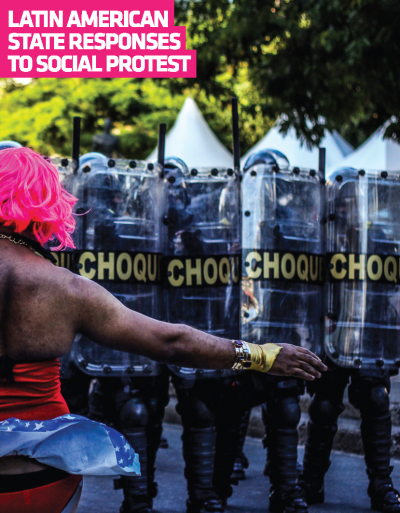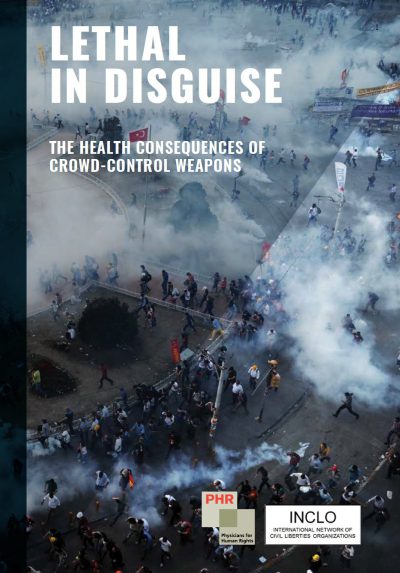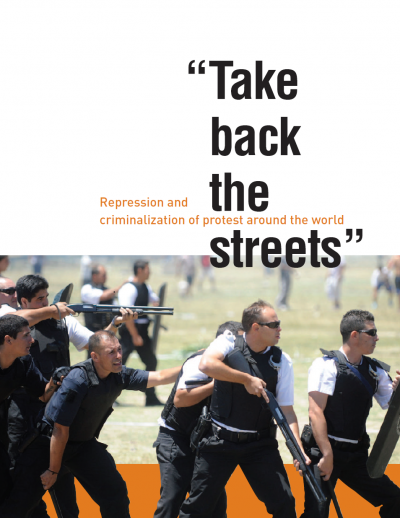Argentina must protect social mobilization, not silence it
More than 35 international and regional organizations call on the argentine government to comply with its international obligations on the right to protest and to investigate the police action on March 12. They also express their solidarity with the demand of decent pensions and concern about the rise of authoritarianism in Argentina.
Repression as policy: Violence, arbitrary detentions, and the use of dangerous weapons in Argentina
The mobilization outside Congress demanding a pension increase on March 12 was violently repressed in a large-scale operation involving five security forces. Security Minister Patricia Bullrich had warned in advance that there would be repression. Tear gas, rubber bullets, and arbitrary detentions marked a day in which the government justified its actions by invoking the narrative of an “attempted coup.”
IACHR Hearing: State denies responsibility for December 2001 killings and repression
The Argentine State withdrew its previous acknowledgment of responsibility for the repression carried out in 2001, which it had accepted in 2023. Officials declined to answer questions regarding the State’s new assessment of the events that occurred in December 2001. The events of December 19 and 20, 2001, were an extreme manifestation of state violence following the unjustified declaration of a State of Siege.
Silencing dissent through fear. Restrictions on civic space in Argentina
Autor/a: CELS
10 pages
ver más
Supreme Court upholds historic convictions of political leaders responsible for repression
The Supreme Court of Justice of Argentina —in a ruling dated September 17, 2024 — upheld the convictions of Enrique Mathov and Rubén Santos, who ordered the repression of protestors on December 20, 2001. This decision sets a unique precedent in Argentina and the region, confirming that political leaders bear criminal responsibility for the consequences of their orders to repress.
Bullets and jail: Criminalization of protesters and restriction of democratic freedoms in Argentina
Autor/a: CELS
14 pages
ver más
Six Months of Javier Milei’s Government in Argentina: Shock Doctrine and Libertarian Authoritarianism
On a new tour in Europe, President Javier Milei will visit Hamburg and Berlin this weekend. Together with the German organization Misereor, we are publishing this report in Spanish and German on the concrete risks to human rights posed by the measures of the La Libertad Avanza government.
Milei’s administration in Argentina: A brief overview of South America’s leading far-right figure visiting Germany
Published in German on the Heinrich Böll Stiftung website.
100 Days of Javier Milei’s government: vindicates the dictatorship and attempts to militarize domestic security policies
Javier Milei’s government vindicates the criminal plan of the armed forces carried out during the 1970s. But it is not just an attempt to rewrite history and deny these crimes; it also aims to legitimize his policies in the present.
CELS goes before the UN to denounce setbacks in rights to protest, housing and the impact of Argentina’s debt
The denouncement was made during the 55th session of the Human Rights Council in Geneva, Switzerland. We spoke with special rapporteurs about how the government’s economic and social policies degrade the living conditions of the majority of Argentines.
Repression at the Congress: we call on the IACHR to protect the right to protest
Together with human rights defender organizations, we asked that the Inter-American Commission on Human Rights (IACHR) take precautionary measures in favor of press workers, human rights defenders, and protesters. We expressed our deep concern about the recurrence of disproportionate security operations that result in people being detained and seriously injured.
With more than 1,700 signatures from organizations, we condemn the protocol against protest before the UN and the IACHR
Jointly with trade unions, social movements, human rights organizations, and entities focused on social, trade, environmental, indigenous, migrant, transfeminist, religious, children’s, student, and political causes, we have requested international mechanisms to demand the Argentine State stop the implementation of new regulations that seek to restrict and repress public protest. These submissions were also supported by 15,000 individual signatures.
We denounced before the IACHR the increase in indiscriminate use of less lethal weapons to suppress protests
With over 20 international and regional organizations we questioned the irregular and disproportionate use of these weapons by security forces and their serious consequences on health and human rights of people who exercise their right to protest.
IACHR: Request for a visit to Argentina to assess violations against indigenous peoples
Rights organizations and representatives of indigenous communities highlight an increase in violence and structural racism by the state, denial of access to territory, lack of prior consultation and the critical situation in the province of Jujuy.
Limitations on the right to protest in Jujuy
This week, human rights organizations submitted a letter to the Constituent Convention expressing our concern about the proposed human rights setbacks in the province’s constitutional reform. The process has been conducted with unreasonably tight deadlines, lacking the necessary participation and debate, and raising concerns about its legality and legitimacy. This reform will have a detrimental impact on the right to protest, among others.
UN universal periodic review: What is Argentina’s human rights situation?
Argentina will be reviewed in the United Nations Human Rights Council on Monday, January 23. It will have to report to its peers on compliance with its international commitments on human rights matters. CELS, along with other organizations, produced reports as prior contributions for the assessment and recommendations to be produced by this mechanism. We will also be present at the session in Geneva.
Indigenous peoples: the state fails to meet its commitments and backslides in response to racist pressure
Despite having the right to ownership and possession of their ancestral territories, this right is not enforced nor are there policies in place to guarantee that Indigenous people can live out their lives in keeping with their identity. The progress made in recent decades has not been sufficient. State response is often couched in rhetoric and stigmatizing stereotypes. The growing number of complaints is linked to this historic debt.
Racism, police violence and drug policies on the UN Human Rights Council agenda
Together with other human rights organizations, in this session we worked on various security and human rights issues.
Colombia: Call for the End of State Violence and for the IACHR to Investigate on Acts of Repression
650 civil society organizations call for a thorough investigation of the repression of social protest and request an on-site visit by the IACHR and the creation of a group of experts.
8 years since the Cárcova massacre: impunity for police chiefs
Throughout this period, the judiciary has failed to investigate the criminal responsibilities of those who led the operation.
Using the G20 as an excuse to justify state violence
On the pretext of the upcoming G20 meeting in Buenos Aires, the government is promoting the notion of “internal enemies” and trying to justify greater levels of persecution of political dissidence and repression and criminalization of protest.
Protests in Buenos Aires: activists detained and migrants persecuted
While repressing the October 24th protest, the police detained social and political activists. In addition, the national government threatened to deport the migrants who were detained.
Pressure increasing on Argentine civil society, a vital force for change
Argentina is consolidating rollbacks in some key areas of social contestation, with cases of violent police responses to public assemblies, increased judicial persecution of activists and organisers, and a political discourse supporting them both.
Grave human rights crisis in Nicaragua
The repression of social protest carried out by Nicaraguan security forces and para-police groups has left at least 273 people dead and 1800 injured in the last three months. What started with demonstrations against a pension reform has ballooned into a human rights crisis.
Defending Dissent: Report launch at the UN Human Rights Council
Joint research by the International Network of Civil Liberties Organizations (INCLO) and the International Human Rights Clinic of the University of Chicago Law School (IHRC) offers practical guidance on how law enforcement can protect human rights when policing protests.
UN Human Rights Council urged to investigate violence in Palestine
“Enough is Enough”: 95 civil society organizations call on the UN Human Rights Council to urgently launch a Commission of Inquiry to investigate violence against protesters in Palestine.
Social protest: Police violence against photographers and journalists
The SiPreBA media workers trade union and CELS published a report documenting cases of people injured, detained and charged with crimes while documenting protests in 2017.
Maldonado: UN Committee on Enforced Disappearances closed urgent action and requested exhaustive, impartial investigation
The UN Committee on Enforced Disappearances closed its urgent action that had requested the Argentine government to search for and find Santiago Maldonado, while reminding the state of its obligation to guarantee an exhaustive, impartial and independent investigation.
One month since the repression of December 14
Seven people remain detained over incidents related to the protests of December 14 and 18, in the framework of criminal cases filed at the federal level. These prolonged detentions based on weak arguments imply very worrisome processes of criminalization. This situation also worsens the deterioration of conditions in which criminal processes unfold, hindering the right to defense.
Protest, social movements and state crackdowns
A fresh round of content published on our Right to Protest platform covers ground across the world: from Kenya, Hungary and Australia to Peru, Canada and Argentina. The threats to this fundamental right can be seen on the street, with violent repressions, and in terms of state surveillance and judicial persecution. This online project was developed by openDemocracy, CELS and INCLO, with support from the ACLU.
The right to protest is in danger
A violent and intimidating police operation. Arbitrary detentions. Federal criminal charges. Political support for police violence. No specific legal framework for regulating the intervention of federal security forces in protests. Threats by political authorities, violent actions by security forces and their judicial validation – all of these are ways of limiting the right to protest.
In defense of the agreements forged in democracy
On Monday, December 4, the 2017 Annual Report edited by Siglo XXI will become available. The prologue, which we are sharing in advance, calls attention to decisions, measures and events that adversely affect critical items on the human rights agenda as well as protection mechanisms. The government response to grave incidents, repeated incidents of repression and discourses about present-day threats and episodes from the past put the human rights consensuses achieved in Argentina on alert. These have been compounded by judicial decisions that take aim at some of the pillars of democracy. This situation requires safeguarding human rights principles from the dynamic of overall polarization.
The Right to Protest worldwide
We are unveiling an online platform that brings together original articles, videos and interviews on the right to protest, at a time when demonstrations are proliferating worldwide and states often respond with violence. This project was developed by openDemocracy, CELS and INCLO, with support from the ACLU.
Disappearance in democracy: One month without word of Santiago Maldonado
Today Argentines will take to the country’s plazas again to demand an answer to the question “Where is Santiago Maldonado?”
Human rights crisis in Venezuela
The Venezuelan government did not protect the right to life and restricted the rights to freedom of expression, of assembly and of political participation. The United States government imposed new legal and financial sanctions on the country. The situation requires the international community’s active commitment to support Venezuela in finding a sovereign way out of the crisis.
Ten years after the murder of Carlos Fuentealba: the Supreme Court faces a historic opportunity
This is an opportunity for the high court to reverse the impunity in this case and send a clear message on how the state must guarantee the right to protest.
IACHR: Repression and criminalization of social protest in Jujuy
The Argentine state was called to appear before the IACHR to give its response regarding the repression and criminalization of social protest in Jujuy. In that province criminal, misdemeanor and administrative proceedings are used to limit the right to protest, freedom of expression and freedom of association.
Latin American State Responses to Social Protest
Autor/a: CELS
62 pgs.
ver más
Ministry of Security petitioned over repression of Mapuche community
In three separate operations, national and provincial security forces used unusual violence to repress members of the Lof Cushamen Mapuche community of Chubut, who have been subjected to criminalization and harassment.
Brutal police operation and torture of Nam Qom community in Formosa: hearing before IACHR
A hearing will be held before the Inter-American Commission on Human Rights (IACHR) regarding violence against the Nam Qom community in August 2002 and the lack of state response.
Lethal in Disguise: The Health Consequences of Crowd-Control Weapons
Autor/a: International Network of Civil Liberties Organizations (INCLO) and Physicians for Human Rights (PHR)
56 pgs.
ver más
Legal arguments begin in trial over repression on December 19-20, 2001
This brutal crackdown on protesters at the height of an economic, social and political crisis caused five deaths and 227 injuries, in Buenos Aires alone.
Take Back the Streets: Repression and Criminalization of Protest around the World
Autor/a: ACLU, ACRI, CCLA, IEPR, HCLU, KHRC and Liberty
69 pgs.
ver más


